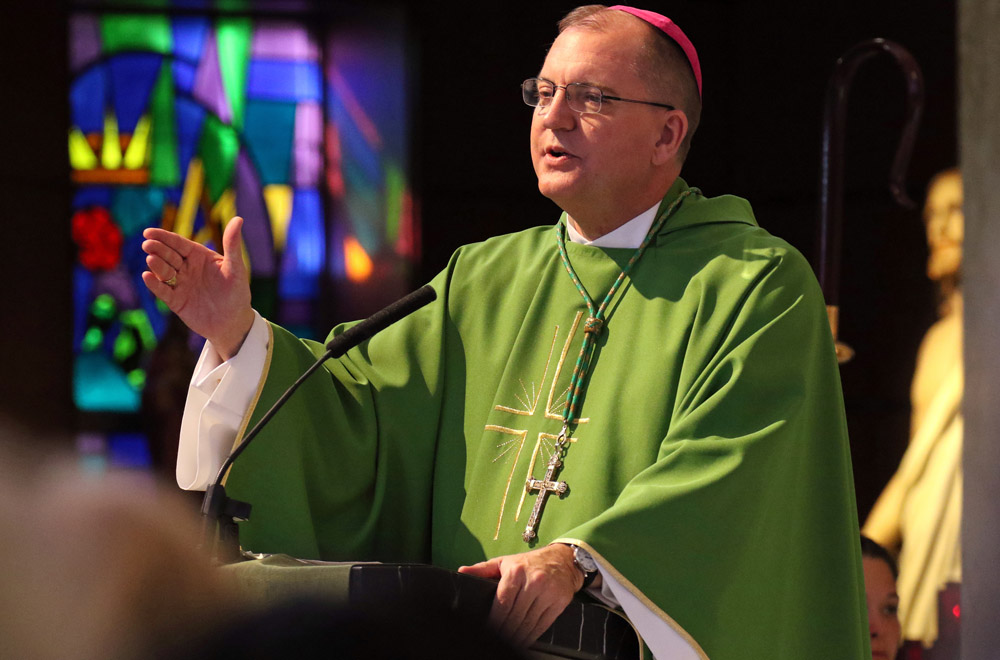
Bishop John Barres of Rockville Centre, New York, delivers his homily during Mass Sept. 2 at Sts. Cyril & Methodius Church in Deer Park. (CNS/Gregory A. Shemitz, Long Island Catholic)
After reading his bishop's pastoral reflection on the 50th anniversary of Humanae Vitae in July, Don Zirkel made a suggestion.
Why not, he wrote to Bishop John Barres of Rockville Centre, New York, join him on the road, talking up responsible parenthood and the joy of marriage around the Long Island diocese?
It might make a good combo: Barres, the scholarly bishop — a Princeton University graduate — with the longtime activist deacon, widower, father of nine and grandfather of 26, with contrasting stances on the church's views on birth control.
Zirkel, 91, from his apartment at the Dominican Sisters' Assisted Living Facility here, noted that many of his Long Island Catholic friends received the pastoral letter — it was sent to every registered family in the diocese, which claims some 1.4 million Catholics — and were upset. They told him such, confiding in the diocese's oldest active deacon, who still occasionally preaches at Our Lady of the Miraculous Medal Parish in nearby Wyandanch.
As a deacon, Zirkel made the news for getting arrested at a shopping mall protest against the second Iraq War. As editor of the Brooklyn Tablet, he generated headlines for supporting women's ordination and opposing the refusal to allow women to serve Communion at Pope John Paul II's visit to New York in 1979. He still keeps a headline from the day: "Editor Sparks Debate," proudly describing his role as a journalist.

Don Zirkel (NCR photo/Peter Feuerherd)
The former editor, his apartment strewn with papers — like his office in the pre-computerized newspaper days — and wedding photos of Marie, his deceased wife, told NCR that the bishop has a high hill to climb in convincing his flock of the official church position on contraception.
The language of Barros' pastoral doesn't help, he said.
It is replete with phrases such as "I love you so completely, I will become a parent with you." And, from a contracepting marriage partner, "I love you and will give myself to you, but not totally, there is something I will keep for myself and deny to you and God."
In his letter to Barros, Zirkel noted, "Marie and I joyfully co-created nine children and we never had Solemn High Sex like that."
Zirkel wrote that he agreed with many portions of Humanae Vitae and Barres' pastoral, both of which uphold the beauty of marriage and what the deacon described as the "divine invitation to be co-creators of children." But those uncontroversial sentiments stack up against Barres' defense of a blanket condemnation of artificial means of contraception, an issue that alienated many faithful Catholics of Zirkel's generation, and is often ignored by Catholic child-rearing married couples today.
He said that Barres' letter is indicative of what Pope Paul VI did 50 years previously: ignoring the counsel of married couples and, in particular, women, in formulating a stance on birth control. Zirkel's letter recounts the history of Paul VI's ignoring the advice of the majority of the commission he appointed to address the issue.
"It would seem strange to prepare a document on racism without consulting people of color." wrote Zirkel.
"The growing recognition of the equality of women asks why the meaning of sex should be decided by men," he wrote. "My anguish and prayers continue. I am not completely comfortable with using the coming sentence. But it is true. And must be said aloud 'CELIBATES DON'T KNOW WHAT THEY ARE TALKING ABOUT.' "
Zirkel wrote that Pope Francis, who appointed Barres to the Diocese of Rockville Centre from Allentown, Pennsylvania in 2016, is moving the church towards a more listening posture.
Francis, wrote Zirkel, has made no official changes but he's open to the use of condoms when one partner is HIV positive. Francis, famous for earthy advice, derided the idea that to be good Catholics, "we have to be like rabbits."
Zirkel invited Barres to meet and pray with him.
Advertisement
"The High Church must be in contact with the majority, the Church from Below," he wrote, suggesting a wide agenda.
"Some live in the past. My yesterday is too crowded. I have this dream that, in whatever time I have left, in preparation for the Catholic Reformation of Vatican III, the bishop and I might work and pray together. With others, we could produce discussion guides on subjects like the roles of laity, women, nuns, monsignors, minor prophets and the (Catholic) press, Christian unity and seldom-used sacraments, Jesus' sisters and brothers, life on other planets and in heaven, wealth and abnegation and meekness, faith and despair and obedience, post-Christian era, holy days of obligation," wrote Zirkel.
The bishop, wrote Zirkel, "is a hero to some, a threat to others. Like me, he is committed to prayer and challenging preaching. He is charming and logical. But not yet dialogical."
The dialogue will have to wait. Zirkel has heard no response from the bishop, who declined an opportunity to be interviewed for this article.
[Peter Feuerherd is a correspondent for NCR's Field Hospital series on parish life and is a professor of journalism at St. John's University, New York.]
Editor's note: We can send you an email alert every time The Field Hospital is posted. Go to this page and follow directions: Email alert sign-up.








